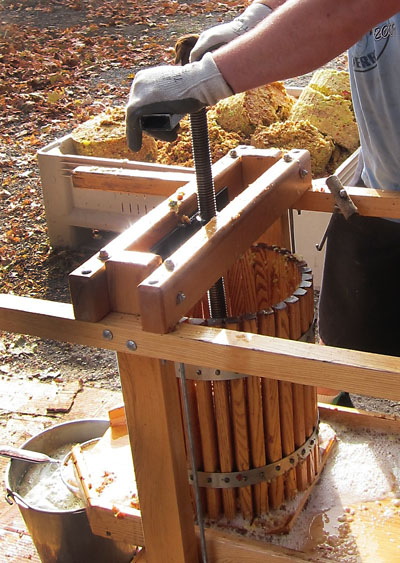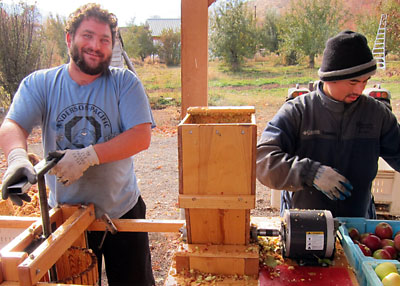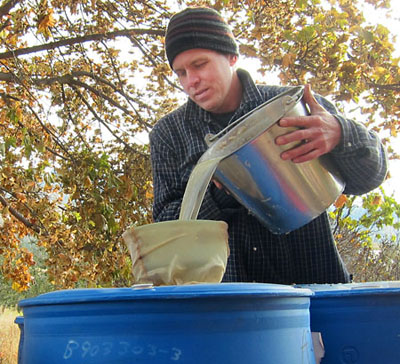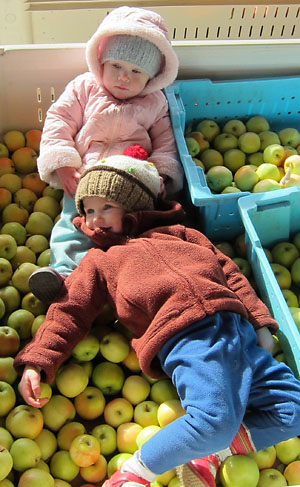home | internet service | web design | business directory | bulletin board | advertise | events calendar | contact | weather | cams

 The old-style slat barrel press is the standard tool for turning apples into juice. First, apples are placed into a hopper with a grinder that shreds the apples into pulp. That pulp is then compressed with a large hand-crank screw to squeeze the juice from the pulp. The old-style slat barrel press is the standard tool for turning apples into juice. First, apples are placed into a hopper with a grinder that shreds the apples into pulp. That pulp is then compressed with a large hand-crank screw to squeeze the juice from the pulp.Drinking the Fruits of Labor Growing apples and turning them into juice or cider has deep roots in the Methow. Just ask Carl Miller. “Apple cider has a strange place in our family history,” said Miller, 73, of Winthrop. Back around 1910, Miller’s grandfather Henry Dammann and Miller’s great uncle Fred Dammann lived up the Chewuch River near Eightmile and the old apple orchard on Uphill Road. “One year they brewed up a big barrel of hard cider, but come midwinter there was a dispute about who had drunk most of it,” said Miller. According to Miller, the neighbors and brothers never spoke to each other again for 30 years. “It must have been some pretty good cider.” Early pioneers planted the first apple orchards in the Methow in the late 1880s. Back then, valley apples had a regional reputation as delicious “good keepers” and commanded a premium price. But drought in the ‘20s, then the introduction of cold storage (which made Methow apples less competitive) and finally a killing freeze in 1968 (local temperatures dropped to 50 degrees below zero) wiped out many of the remaining big orchards in the valley. Commercial apple production peaked in the valley a half-century ago, but a few small producers have hung on, new orchards have sprung up in the last decade and a lot of backyard growers have a few trees for personal use. But for an orchard to survive, those growing apples must strive to figure out creative ways to compete. That might mean producing and marketing premium-quality organic fruit, supplementing fresh sales with apples grown specifically for the growing cider market, or transforming apples into fresh juice or hard cider. “Hard cider is a growing business, but it’s nothing new,” said Richard Wassen, who started the Methow Valley Ciderhouse on the East Chewuch near Winthrop. “Hard cider used to be the most popular drink in America before it was replaced by beer, so we’re reviving a long American tradition.” Wassen now has 2200 trees dedicated entirely towards producing cider apples. He produced 800 gallons of hard cider in 2011, up from 500 the previous year. In three or four years, Wassen hopes to produce three of four thousand gallons of cider, employ a half-dozen people and distribute across the region. Wassen might be on the right side of a trend. According to industry studies, hard cider sales in the U.S. have doubled since 2005 and grew 26 percent from 2010 to 2011. Apple cider is now the fastest growing category of adult beverage in America. Wassen currently makes four varieties of hard cider: Howling Wolf (a semi-sweet carbonated cider), Honey Bear (a sweet, carbonated cider), Eagle Screeching Scrumpy (a semi-bitter English-style still cider), and Pinnacle Goat (a non-carbonated semi-sweet variety). Wassen sells 22-ounce bottles for around $9 at local venues such as the Glover Street Market, The Red Apple, the Mazama Store and does some limited distribution in Seattle.  Stephan Grimes, left, and Alex Lopez man the press for the Twisp River Pub. Due to rising demand, last season the pub doubled its production from 600 to 1200 gallons of hard apple and pear cider made from local fruit. Stephan Grimes, left, and Alex Lopez man the press for the Twisp River Pub. Due to rising demand, last season the pub doubled its production from 600 to 1200 gallons of hard apple and pear cider made from local fruit. Jesse Bonn, who brewed for the Twisp River Pub, pours freshly-squeezed apple juice through a filter into a holding barrel for later fermentation. Jesse Bonn, who brewed for the Twisp River Pub, pours freshly-squeezed apple juice through a filter into a holding barrel for later fermentation.“I like agriculture, I like apples, and I like alcohol, so it seems a good fit,” said Wassen. For orchardists like Jon Richardson and Stina Booth, the market for cider apples is a small, but significant part of their business. Booth and Richardson have around 800 trees on their organic orchard between Twisp and Carlton. Most of their fruit goes to fresh sales, but they also earn some of their income from producing cider apples. “In the end, maybe 20 or 30 percent of our crop goes to cider,” said Booth. “It’s a helpful supplement to our business; we can recoup some value from fruit that has cosmetic blemishes or gets frozen on the trees.” She and Richardson grow around 25 different varieties of apples, including some classic old cider varieties such as Kingston Black, Ellis Bitter, Roxbury Russet and Foxwhelp – a cider apple that was popular back in England back in the 1600s. The Twisp River Pub is the main buyer for Booth and Richardson’s cider apples. Last year, brewer Jesse Bonn doubled the amount of cider he was brewing for the Twisp Pub since previous batches have sold out early. Bonn (who recently moved to Olympia to take a job at Fish Brewing Company) sourced all his fruit from local, organic growers in the Methow and Tonasket areas. “We’re going to have three different ciders this year,” said Bonn before he left. “We’ll have 500 gallons of cider made from some of the mouth-puckering bitter-sharp apple varieties, 300 gallons of a light, sweet cider made mostly of Jonathan apples, and 400 gallons of soft, buttery, pear cider that has a touch of dryness.” Typically a batch of hard cider takes four to five months to finish from pressing to pint glass. As anyone who has cranked a press cider knows, the process involves lot of hard physical labor. Using an old-fashioned press, a motivated crew can produce 100-200 gallons of fresh juice a day. The nature of the work lends itself well to a social occasion, said Dave Sabold. For the past couple decades, Dave and Marilyn have hosted the Methow Cider Squeeze, an annual gathering that attracts up to 200 people. “It’s just a great social event,” said Dave Sabold. “Everyone shows up with jugs and goes home with fresh apple cider.” Growers around the valley donate apples to the event, which is sponsored by the Methow Conservancy. Sabold prefers to freeze his fresh juice rather than fermenting it, although he will occasionally let some go to vinegar, which he uses as a foundation for salad dressings.  Cider pressing in the Methow is often a social event. Cider pressing in the Methow is often a social event.The old-fashioned slat barrel style press the Sabolds use for the Cider Squeeze is a piece of history itself. They got it back in the 1970s from Ken White, a Methow character of homestead stock who died back in 1992. Dave estimates the press is around 100 years old. John and Elizabeth Sinclair purchased one of the last remaining commercial apple orchards between Twisp and Carlton in 2001, but weren’t sure at first how to best use the property. Then they had a party. “We invited some people over and pressed some apples from the trees around the place,” said Elizabeth Sinclair. “We took one sip of that juice and just looked at each other and didn’t even need to say anything. We knew what we were going to do.” Since then, the Sinclairs have worked at reviving and replanting the old orchard. Today the family has around 8,000 dwarf trees growing on a trellis system. Last year the couple launched Mazama Juice, a business that sells fresh, organic apple juice in the Methow and through CSAs and Whole Foods in Seattle. “Growing fruit is a tough business. For small producers, the challenge is to offer a unique product or find a way to add value,” said Elizabeth. “There’s something very particular about the Methow, what our climate does for apples.” Currently, most of the Sinclair’s primary crop of Honeycrisps goes to fresh sales, but they are gradually growing their sales of apple juice. In time, they hope to expand their freezer space and production capacity so they may make more of the apples they grow into Mazama Juice. For every commercial grower in the Methow, there are many dozens of backyard enthusiasts like Kip Roberts with a couple or a couple dozen trees. Roberts, who lives up the East Chewuch, has a spread of 20 apple and 15 pear trees with a focus on varieties that produce fruit that is ideal for art of crafting delicious hard cider. His personal favorite cider apple is the Kingston Black. “My orchard looks decidedly ‘un-orchardy,’ trees here and there, nothing in straight lines,” said Roberts, who makes both ‘still’ (non-carbonated) and sparkling champagne-style hard ciders for personal consumption. “I love it because the whole process from trees to apples to cider is a constant learning process.” 3/30/2012 Comments This past weekend in Seattle "Taste Washington" a yearly event held at the Seahawk's stadium exhibition hall was home to hundreds of food, wine and Cider booths that pleased thousands of "foodies" with a gastronomical extravaganza. Myself, and other members of the Northwest Cider Association (nwca.com) were in attendance and well received by the food and drink crowd. It only makes sense, that in the state which produces nearly half the nation's apple crop, Cider would see a revival of what was for centuries (before Prohibition) the most popular drink in America. Cider's development in Washington, is at about the same point wine's was 30 years ago, and growing rapidly. North Central Washington is prime country for what could become one of the finest Cider producing areas in the World!! Keep on Sippin' Cider! Richard WassON (take note, Patrick!) Methow Valley Ciderhouse Richard Wasson Winthrop
|